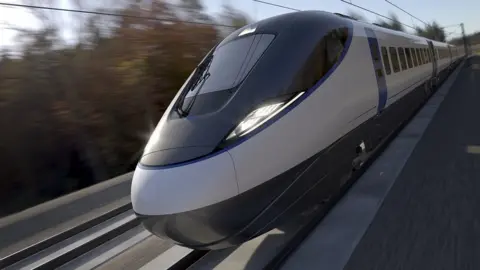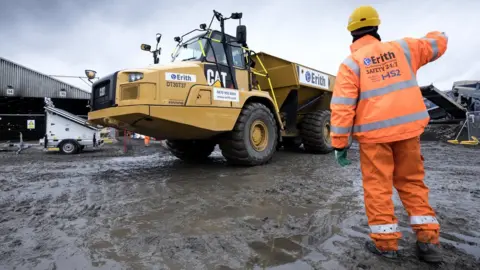Delaying HS2 will increase costs, industry says
 HS2
HS2The delay to part of the HS2 high-speed rail line will increase costs in the long term, the rail and construction industry has said.
On Thursday, the government announced a two-year delay to the Birmingham to Crewe leg, blaming soaring costs.
The transport secretary said he was "committed" to the line linking London, the Midlands and the North of England.
But GB Railfreight and the National Infrastructure Commission have both criticised the decision.
HS2 has been dogged by delays and rising costs - in 2010, it was expected to total £33bn, that figure has now soared to £71bn.
But the boss of GB Railfreight, John Smith, warned against going ahead with a "half-baked" project.
A report by accountancy firm Deloitte in 2021 found rail freight contributed nearly £2.5bn to the UK economy every year, and GB Railfreight moves more than a fifth of that freight.
Mr Smith told the BBC's Today programme that HS2 was "critical in terms of freeing up capacity on the network" and a key element of decarbonisation if the UK was to hit government environmental targets.
"Doing it half-baked like this creates a number of problems, not least that the traffic on it that heads to Liverpool, Manchester and further north to Scotland will now spit itself out onto the old infrastructure at places like Crewe."
Mr Smith also voiced concerns the Crewe leg would be cancelled altogether.
"I understand the delays and money doesn't grow on trees but there should be a complete project. I think whilst it might save in the short term, I'm fairly convinced it will cost more."
Announcing the delay to the project on Thursday, Transport Secretary Mark Harper said it was due to "significant inflationary pressure" and increased project costs.
The government hopes that the delays will allow it to spread the cost over a longer period of time, making it more affordable by reducing annual expenditure.
Chancellor Jeremy Hunt, who will outline his Budget next week, wants debt to fall as a percentage of GDP within five years - a target explicitly set by the prime minister.
 HS2 Ltd
HS2 LtdHowever, Sir John Armitt, chair of the National Infrastructure Commission, said the delay would just push up costs in the long run.
"Every time you delay a construction project you inevitably increase its costs because they don't get stopped, you just run them out over a longer period of time," he told the BBC.
"This is a project which is today creating tens of thousands of jobs, it encourages investment in the future. By putting in this delay we simply put doubt into people's minds.
"The best thing we can do is not say let's cancel it, the best thing we can do is be absolutely certain that we're going to build it as quickly as possible."
Sir John said the government "might slow down the cash-flow a little bit" but it would increase the final cost and could affect the confidence and certainty investors had in the UK.
"We're about levelling up, we're about competing with the world. We don't level up, we don't compete with the world if we create uncertainty," he said.
One company that is reconsidering its investment options is SG World, a software company based in Crewe.
The company's chief executive, Mark Haase, said that without HS2 his access to skilled workers would be affected and the two-year delay would slow the firm's growth prospects.
"As a manufacturer it's about two things: it's about investment and in a vibrant economy we can invest our capital and with the delay we have to reassess that. The other thing is the access to our talent pool," he said.
He added that the delay "will cost us between 5-7% of our growth".
The Conservative MP for Crewe and Nantwich, Dr Kieran Mullan, said it was important for the region to "keep our eyes on the prize".
"The investment is still coming. I can live with two years later... this remains a generational investment and its impact will be huge over many decades."
